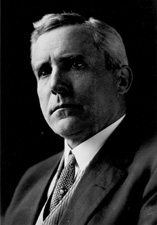James A. Reed
James Alexander Reed (born November 9, 1861 in Mansfield , Ohio , † September 9, 1944 in Oscoda County , Michigan ) was an American politician ( Democratic Party ) who represented the state of Missouri in the US Senate .
Attorney and Mayor of Kansas City
Born on a farm in Richland County, James A. Reed moved his family to Cedar Rapids , Iowa , at the age of three , where he attended public schools and Coe College . He became a lawyer and settled in Kansas City , Missouri. There he was a member of the city council from 1897 to 1898; then he was Attorney General of Jackson County until 1900 , before he took over the office of Mayor of Kansas City that year as the successor to James M. Jones .
During this time, he achieved great national recognition when, under his guidance, the Convention Hall was rebuilt within 90 days. The event building, which opened in 1899, burned down on April 4, 1900; on July 4th of the same year the Democratic National Convention was to take place there. Reed managed to get the work done fast enough for the Democratic Convention to begin on time in Kansas City.
senator
In 1910, James Reed was elected to the US Senate. He stayed there for three session periods before leaving the Congress in 1929 at his own request . In the Senate, he made a name for himself as an opponent of corruption and government programs, which he saw as useless. Unlike many members of his party, he was an opponent of the League of Nations . In 1928 and 1932 he ran unsuccessfully for the presidential candidacy of the Democrats.
In 1913 he made a contribution to the state of Missouri. As a member of the Senate Banking Committee , he changed his voice on the Federal Reserve Act , which was ready to go into effect. As a result, Missouri received two of the Federal Reserve Banks , which were located in St. Louis and Kansas City, making it the only state with two branches of the central bank.
When Reed left the Senate, the writer Henry L. Mencken wrote an appreciation in which he emphasized the commitment of the politician against "demagogues and charlatans" of both parties. Reed returned to Missouri and started working as a lawyer; he was also an active member of the Civitan movement . He died in his summer home in Michigan.
Web links
- James A. Reed in the Biographical Directory of the United States Congress (English)
- James A. Reed in the database of Find a Grave (English)
| personal data | |
|---|---|
| SURNAME | Reed, James A. |
| ALTERNATIVE NAMES | Reed, James Alexander (full name) |
| BRIEF DESCRIPTION | American politician (Democratic Party) |
| DATE OF BIRTH | November 9, 1861 |
| PLACE OF BIRTH | near Mansfield , Ohio |
| DATE OF DEATH | September 9, 1944 |
| Place of death | Oscoda County , Michigan |

